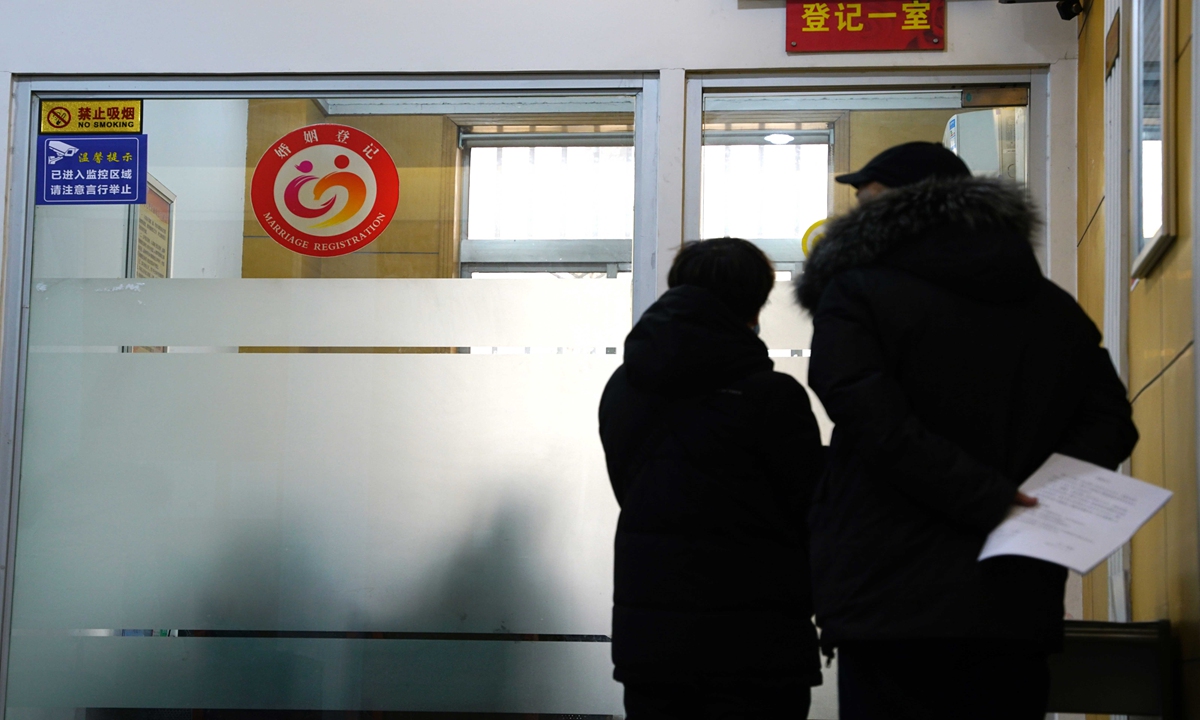IN-DEPTH / IN-DEPTH
One month on, cooling-off period unbearable for unhappy couples, but helps prevent impulsive divorce
Calming it down

How to get divorce in China Graphic: GT Photo: VCG
A 47-year-old Beijing man surnamed Su has waited for almost a month for the city authorities to approve his divorce even though he and his wife both agreed on ending their marital relationship.February 1 marks the first day when Chinese couples can get consensual divorce after completing the 30-day cooling-off period required by the Civil Code that came into effect on January 1. Heated discussions had flooded the internet over how necessary it is to initiate such a period and how much the authorities should intervene in people's decisions on household matters.
An increasing number of cases of impulsive divorce in recent years, a decline in the fertility rate, and the traditional expectation of a united family in Chinese culture all contributed to the introduction of the cooling-off period to prevent impulsive divorces, Zhang Jing, a Beijing-based matrimonial lawyer, told the Global Times.
According to the latest statistic of the Ministry of Civil Affairs, 9.273 million marriages and 4.71 million divorces were registered in 2019, and the divorce rate was 3.4 per thousand, compared with 3.2 per thousand in 2018.
However, some people worry that the cooling-off period would make it harder for the vulnerable partner in a marriage to divorce, especially women suffering from domestic abuse; it also raises the cost of divorcing.
Experts and couples reached by the Global Times appealed for more considerate marriage counseling services during the month-long cooling-off period and wondered whether the length of cooling-off period can be chosen by couples according to their actual marriage situation.
A long wait
Su found out on January 5 that his wife was cheating on him and the couple filed for consensual divorce the next day.
"The feeling during the cooling-off period is weird. She is still my legal wife but we have already fallen apart emotionally," Su told the Global Times.
Although this middle-aged couple, who have been together for 13 years, talked calmly and ensured there was no turning back, they still had to wait for one month before being officially divorced.
"For those of us who do not divorce on impulse, can the cooling-off period be shortened?" Su wondered.
When Su and his wife applied for divorce, the staff at the civil affairs bureau in Beijing asked whether they needed marriage counseling service, which is totally voluntary and free of charge.
Su believed that cheating is an unforgivable mistake and they both amicably agreed for the divorce, so he and his wife refused the service.
On the first night of their cooling-off period, Su and his wife sat down and reflected on the problems in their marriage calmly and rationally for two hours without any squabbling, and felt differently than the night before when they had not yet filed for divorce.
"The cooling-off period indeed puts us into a new situation where we are emotionally detached but legally together; it helps us look back at our marriage more rationally," Su said.
Su's wife said they had insufficient communication as a couple as Su is too introverted. Su admitted it and apologized, although his wife didn't want to tell how long she had cheated on him.
The couple have no kid which made it simple for them to divide their property. Su got their apartment which he had bought before marriage, while his wife got most of the family savings and the car.
"A period of two weeks is enough for us to deal with the property and moving out. Waiting for another two weeks is painful for both of us. If she lives with her lover during this time, it can still be considered as cheating on me, right?" asked Su.
The cooling-off period may not be fair to one partner in a marriage where the other one has made most of the mistakes, Qiu Chunna, a marriage mediator working in the women's federation of the Guangming district in Shenzhen, South China's Guangdong Province, told the Global Times.
Su said he understood that the country wants to minimize cases of impulsive divorce by setting a cooling-off period, which is intended to lower the divorce rate and reverse the declining fertility rate. "It may be better to allow couples, who have reached the decision to divorce rationally, choose the length of cooling-off period according to their own situation," Su suggested.
According to the new law, if one changes his or her mind during the 30 days or doesn't show up after the cooling-off period, the divorce application can be cancelled.
Su believes it is unlikely that couples will change their mind during the cooling-off period. However, he said if his wife begs for forgiveness, which seems improbable, they can reconsider the decision.

A couple is waiting to submit application outside the divorce registration room at the Yanta District Civil Affairs Bureau in Xi'an, capital of Northwest China's Shaanxi Province, on January 5. Photo: VCG
Saving marriagesPeople wonder what they should do during the cooling-off period. The Global Times has learned from local civil affairs bureaus in Beijing, Chengdu, Nanjing, Xi'an and Guangzhou that the divorce mediation and marriage counseling services have been provided according to locals' needs for many years, and were not introduced specifically for the cooling-off period under the new law.
Civil affairs bureaus all over the country are also deliberating marriage counseling services designed for the cooling-off period. At present, there is no mature marriage counseling programs that are socially acceptable or identified at national level, Lawyer Zhang Jing said.
Qiu Chunna, who has been working as a marriage mediator for four years, said couples who have no major issues such as cheating, domestic abuse or debt, or where only one of the partners wants the divorce impulsively, would like to accept divorce mediation. Setting a cooling-off period may change the divorce decision of these couples.
Generally, couples accept marriage mediation on a voluntary basis. In 2020, only 6 percent of couples applying for divorce at the Guangming District Civil Affairs Bureau where Qiu works chose mediation, however, 90 percent of those who chose mediation eventually changed their mind on divorce.
Qiu successfully mediated a young couple in their 30s who applied for divorce on January 7. The couple were still emotionally agitated when they were at the office, as they had quarreled for one day before and the wife had kicked her husband's leg.
The husband wanted to receive divorce mediation. During the counseling, Qiu learned that there were no major issues in their marriage but they lacked sincere communication.
The marriage mediators always talk with the partners separately, evaluating the possibility of depression and domestic violence first.
"If there is a major issue especially involving domestic violence, we will help the victims to keep evidence and call the police," Qiu emphasized.
Zhang Jing said that the marriage counseling service is a systematic project, which requires a thorough and detailed preliminary survey of the divorce group, classify their needs, and invite experts to formulate corresponding counseling programs; it should not be treated as just as another auxiliary service of marriage.
The young couple dated for two years and got married last May. The wife is a year older than her husband so she wanted her husband to follow her opinion all the time and didn't trust her husband very much. The husband thought he was loyal to the marriage and evaded proper communication with his wife.
After Qiu's mediation, the couple recognized their own problems in the marriage and changed the divorce decision.
Fifty-seven couples applied for divorce with the marriage registration office of the Guangming District Civil Affairs Bureau in Shenzhen from January 1 to 27, among whom only one couple accepted marriage mediation. The number of couples filing for divorce was 37 during the same period last year and 10 of them wanted mediation.
"Fewer couples are accepting marriage mediation, mainly because divorcing couples are increasingly calm and peaceful, and most of them have considered comprehensively before applying for the divorce," Xie Hongsi, a registrar with the marriage registration office of the Guangming District Civil Affairs Bureau, told the Global Times.
Xie believes setting the period is reasonable to save marriages, and it will require longer time to evaluate its effectiveness.
Helping violence victims
The young couple in Shenzhen and Su in Beijing are both lucky as they made conscious decisions during the cooling-off period. However, many people are concerned that the cooling-off period will make it more difficult for the victims of domestic violence to divorce.
The Ministry of Civil Affairs advocated that the cooling-off period only applies to consensual divorce. In the case of domestic violence, the parties may file a lawsuit, and the court shall make a judgment on divorce. The system of divorce cooling-off period shall not apply in such cases.
However, domestic violence could be very difficult to prove in a court. In some cases, the victims are even willing to give up the joint property and custody right, eager to get rid of the violence and get consensual divorce as soon as possible. The financial cost and time for litigating a divorce will be much longer, Lü Xiaoquan, a Beijing-based lawyer at Qianqian Law Firm, told the Global Times.
Such cases may sound extreme, but there are actually many victims. In China, there is one woman beaten by her husband every 7.4 seconds on average. About 30 percent of women in 270 million families have experienced domestic violence. There are 157,000 women committing suicide every year, 60 percent of which is caused by domestic violence, according to the data released by the All-China Women's Federation.
Lü believed that the cooling-off period limits the "freedom of divorce." The divorce decision should be made by the couples themselves, without any influence from others, and the consequences of divorce should also be borne by the two adults themselves, he believes.
Sufficient time and national statistics are required to evaluate the effect of the cooling-off period on reducing divorce rate, he said, noting that he doesn't expect the results to be as optimistic as expected.
"Rather than relying on a cooling-off period to save a marriage, the government should properly guide a positive sense of marital responsibility and popularize relevant laws before marriage. Prevention is more important than cure," he stressed.
The divorce cooling-off period will make it difficult to get consensual divorce at any time, and to some extent, it will help prevent those who want to circumvent the loan restriction policies on housing purchase and the transfer of vehicle ownership through "fake divorce," Guo Yongfa, a lawyer from Beijing Yuecheng Law Firm, told the Global Times.
Lu Yameng has contributed to the story


